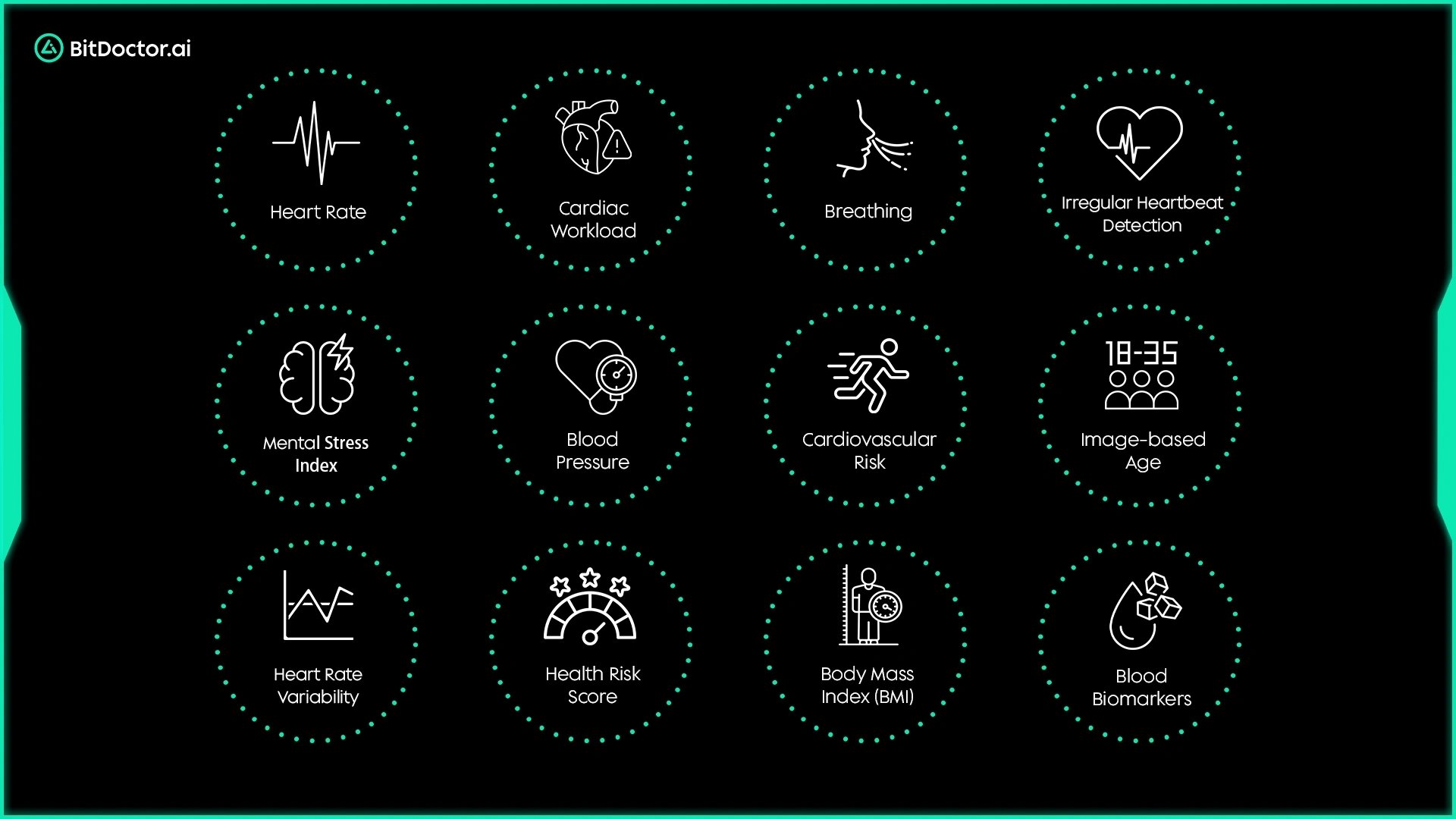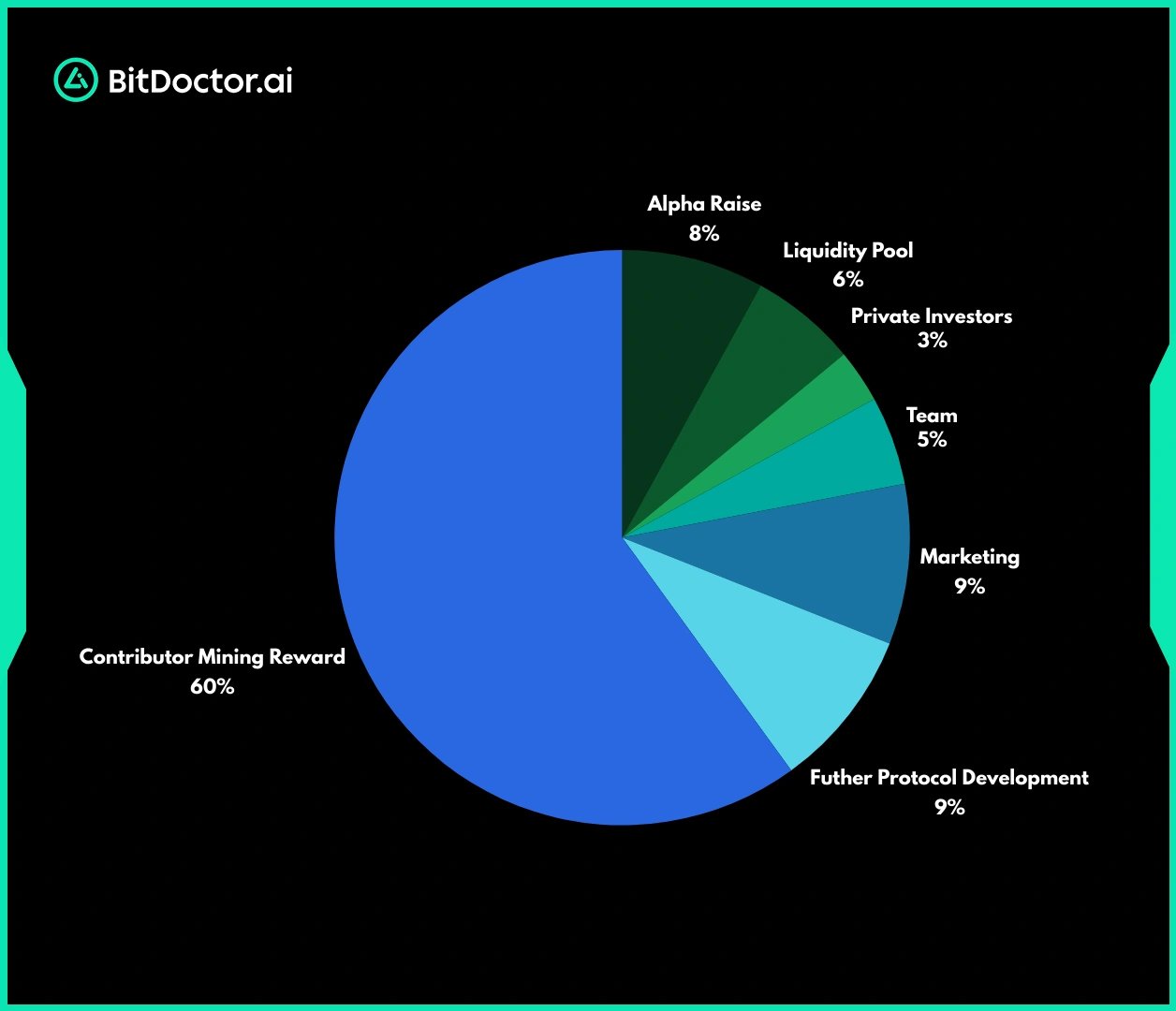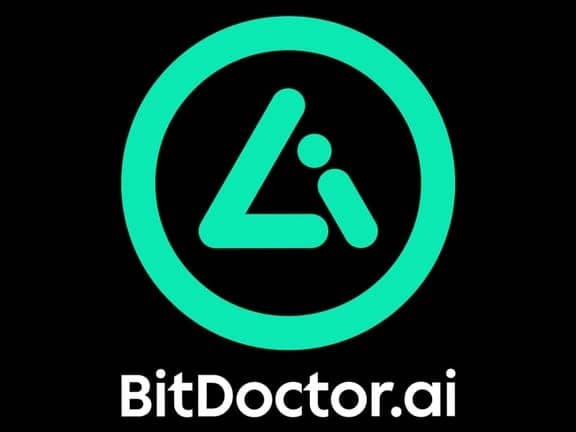Subscribe to wiki
Share wiki
Bookmark
BitDoctor AI
We've just announced IQ AI.
BitDoctor AI
BitDoctor AI is a decentralized health data platform that uses artificial intelligence to analyze facial blood flow for disease detection while incentivizing users to share their health data through a token-based system. [3]
Overview
BitDoctor AI is a medical artificial intelligence system designed to address global healthcare disparities by offering diagnostic services and medical support, particularly to underserved communities. With a growing global population and rising healthcare costs projected by 2030, BitDoctor AI aims to respond to increasing challenges such as emerging diseases, conflicts, and environmental crises. The platform uses medical data and AI technology to deliver consistent health insights across geographic and socioeconomic boundaries. Its development follows a three-stage plan: training the AI as a free diagnostic tool, providing personalized healthcare, and identifying cures for diseases at early stages. BitDoctor AI also targets gaps in the healthcare sector by offering solutions to broader societal health issues. [5]
Features
Blockchain Tech Stack
BitDoctor.AI is built on a decentralized architecture that utilizes blockchain technology to manage health data, perform analysis, and reward contributors. This system integrates Decentralized Physical Infrastructure Networks (DePIN) and Decentralized Science (DeSCI) principles to create a transparent and secure ecosystem. Incorporating a Flywheel Effect aims to drive network growth, while the Data Protocol Vision invites developers and researchers to innovate on anonymized health data. [6]
Core Components
The system operates with several core components. The BitDoctor Smartphone AI Doctor collects health metrics such as heart rate and blood pressure and forwards this data to the system through the BitDoctor Gateway. This gateway serves as the entry point for the data and processes it before forwarding it to the blockchain. The blockchain ensures data integrity and security by storing decentralized identity (DID) and data hashes while also handling the reward system through a Reward Contract.
Data storage solutions include decentralized options like Filecoin and Arweave and centralized databases for backup purposes. The BitDoctor Aggregator is responsible for aggregating and analyzing health data, generating medical reports, and sharing this data with medical providers and AI agents for further use. Stakeholders, including medical institutions and health agencies, pay for access to these reports and insights.
AI agents use the aggregated data to improve medical models for diagnostics and predictive analytics, while contributors to these models are tracked via the Model Contributor Tracking system. The reward system incentivizes data contributors with LIV points, managed by a Data Contributor Validator and a Reward Contract. Medical providers can access aggregated data and reports to support diagnostics and treatment recommendations. [6]
DePIN and DeSCI
Integrating Decentralized Physical Infrastructure Networks (DePIN) and Decentralized Science (DeSCI) is central to BitDoctor's approach, enhancing the decentralization and accessibility of healthcare solutions.
DePIN uses the BitDoctor application as a physical infrastructure to collect health data. Device owners are incentivized to participate by earning LIV points and contributing valuable data to the ecosystem. This infrastructure also supports the training of AI models, utilizing distributed computing and data storage networks such as Filecoin and Arweave. This reduces reliance on centralized entities, democratizing access to AI capabilities. Security measures ensure that data collected through physical infrastructure is stored securely and accessible only through permissioned blockchain mechanisms, maintaining integrity.
DeSCI aims to enhance research by sharing anonymized health data with the global scientific community. This data is accessible to researchers via a pay or token model, ensuring fair compensation for contributors. AI models developed using this data are also anonymized and governed on-chain, promoting transparency and accountability in model development. To encourage further collaboration, DeSCI rewards contributors whose data significantly improves research outcomes, fostering innovation in healthcare. Additionally, some payments from institutions for medical data or AI models are allocated to fund decentralized scientific initiatives, supporting ongoing research. [6]
AI Tech
BitDoctor AI technology combines neuroscience, psychology, physiology, and deep learning to create an affective AI system intended to operate under universal health coverage principles. Positioned at the intersection of affective computing and artificial intelligence, BitDoctor AI uses conventional video cameras, including those on smartphones, to detect and track key facial regions without storing images or videos. It extracts blood flow information by analyzing how light penetrates and reflects off the translucent layers of the skin, capturing signals related to hemoglobin and melanin. This blood flow data is sent securely to the cloud, where it undergoes signal processing and is analyzed using deep learning models to predict physiological and psychological conditions. The system uses a form of video-based photoplethysmography to detect cardiovascular activity by analyzing subtle color changes in the skin. BitDoctor AI processes signals from 17 facial regions and applies machine learning algorithms to estimate blood pressure and related health metrics. Its models have been trained and validated against recognized scientific instruments and tested by regulated medical bodies for accuracy and reliability. [7]
Training
BitDoctor AI trains its models through a detailed process that begins with collecting diverse datasets, including images of facial vascular networks sourced from medical databases, research institutions, and user contributions. Each image is carefully annotated to identify key regions such as melanin and hemoglobin, providing essential data for training. The dataset is then preprocessed to standardize image sizes, improve quality, and eliminate noise. BitDoctor uses advanced machine learning techniques, particularly convolutional neural networks (CNNs), to extract features and recognize patterns in the data. The model training involves deep learning approaches like CNNs, recurrent neural networks (RNNs), and transformer models, focusing on accurately identifying facial vascular features. The model is continuously validated and refined through iterative testing on independent datasets, ensuring high precision and generalization. Performance metrics, including accuracy and recall, are assessed to ensure reliable health analysis. Regular updates with new data keep the AI model aligned with the latest healthcare needs and standards, and all models undergo validation to meet regulatory and clinical requirements. [8]
DePIN Economy
BitDoctor integrates a DePIN (Decentralized Physical Infrastructure Network) shared economy model to create a more open, transparent, and user-driven ecosystem. In this system, users actively participate in the platform by engaging with health scans, engaging in educational activities, and contributing content. The platform incentivizes these activities with token-based rewards, including BitDoctor’s native $LiV tokens. These tokens are issued as rewards for participation and can be used within the ecosystem for services or exchanged for other benefits.
The platform also incorporates decentralized governance through a DAO, enabling users to propose and vote on changes, ensuring the community has a say in the platform’s development. Smart contracts automate the reward distribution process, ensuring users are compensated fairly for their contributions. Additionally, vendors are incentivized to provide high-quality services, with their success tied to user satisfaction and engagement.
Revenue is generated through various streams, including big data sales, content sponsorships, royalty fees from the trading of dynamic NFTs, transaction fees for cryptocurrency swaps, and in-app advertisements targeting user health needs. The collected data, while protecting personal information, can be used for targeted marketing, partnerships with health-related industries, and recruitment for clinical trials.
Overall, BitDoctor’s DePIN model fosters a cycle of mutual benefit. Users contribute to the platform’s growth and success, which in turn provides them with rewards and strengthens the overall ecosystem. [9]
Clinical Measurement Reports
Clinical trials conducted by BitDoctor validate the accuracy of each parameter used in the system. The measurement details and results are documented under each subpage. Because physiological fluctuations occur moment-to-moment, risk estimates can vary between measurements. To account for this, the best estimate of a user’s overall risk is obtained by averaging several measurements throughout the day and multiple days, offering a more comprehensive analysis.
Each measurement requires specific information, including blood flow data extracted from videos of the user’s face using BitDoctor technology, and demographic information from the user’s profile. The data collection setup involves illuminating the participant’s face with LED lights and capturing blood flow information through conventional video, which is recorded using the BitDoctor Application for iOS (research version).
During the data collection procedure, the BitDoctor Application records a 30-second video using the front-facing camera of an iPhone. After the recording, participants are asked to complete a questionnaire to provide their demographic information. This process ensures that the data collected is accurate and the system's functionality is rigorously validated. [10]

Governance
The BitDoctor DAO is a cornerstone of the platform's mission to democratize healthcare and create a positive social impact. Focused on community engagement, the DAO aims to recognize and reward data contributors and healthcare workers, volunteers, nurses, and social workers who play vital roles in expanding healthcare access. This initiative, which will launch after the Token Generation Event (TGE), reflects BitDoctor's commitment to empowering individuals who support healthcare accessibility.
BitDoctor also invites charity organizations to collaborate in amplifying the collective impact, leveraging resources to reach underserved communities that need healthcare assistance. Strategic partnerships with Web2 pharmaceutical brands like Blackmores and Himalaya are also in place to promote health awareness, further reinforcing the DAO's role in cultivating a health-conscious, proactive community.
The DAO leverages BitDoctor's AI technology to enhance healthcare access, especially in underdeveloped areas, by enabling volunteers and healthcare professionals to deliver services directly to those in need. Volunteers are encouraged to be ambassadors for BitDoctor, helping expand the platform’s reach. To recognize their efforts, BitDoctor allocates a portion of the "contributors" rewards pool to financially support volunteers financially, ensuring their dedication is rewarded.
Through a collaborative ecosystem, the BitDoctor DAO is building a global network of change-makers committed to revolutionizing healthcare delivery, promoting health awareness, and improving lives worldwide. The DAO incentivizes data contributors and supports those on the frontlines, making healthcare more accessible, one community at a time. [11]
AIDD
The $AIDD token is a core element of the BitDoctor ecosystem, offering a wide range of utilities that extend beyond ownership. One of its primary functions is ensuring data protection through decentralized computing, which secures user data and prevents leaks by avoiding reliance on centralized servers. Staked tokens contribute to a private and secure decentralized layer, enhancing the platform's privacy measures.
Token holders benefit from discounted access to BitDoctor’s premium products and services, with stakers also earning a share of the platform’s revenue from partnerships with insurance companies, medical research firms, pharmaceutical companies, and health/lifestyle brands.
As part of BitDoctor's Decentralized Autonomous Organization (DAO), $AIDD token holders have a voice in the governance of the ecosystem, promoting loyalty and transparent community engagement. Tokens reward various contributors, including medical specialists, data providers, promoters, volunteers, and social workers who help expand the platform's reach.
In addition, token holders enjoy privileges such as access to specialist consultations and healthcare products from partnered hospitals. Bio-research partners also use $AIDD tokens as a currency to access BitDoctor’s extensive health data assets, supporting advancements in healthcare research. Overall, the $AIDD token strengthens the ecosystem, providing value to users and contributors while enhancing the platform's growth and impact. [12] [13]
Tokenomics

AIDD has a total supply of 1B tokens and has the following distribution: [14]
- Contributor Mining Rewards: 60%
- Protocol Development: 9%
- Marketing: 9%
- Alpha Raise: 8%
- Liquidity Pool: 6%
- Team: 5%
- Private Investors: 3%
Partnerships
- Google Research
- Blockchain for Good by ByBit
- FSL Wallet
- The Binary Holdings
- XProtocol
- ZKcandy
- Plena Finance
See something wrong?
